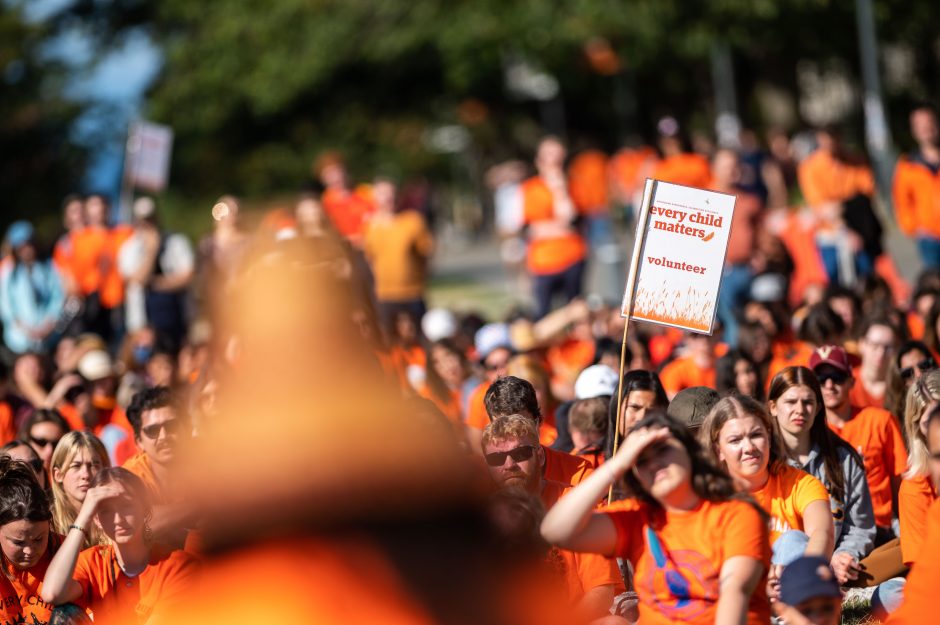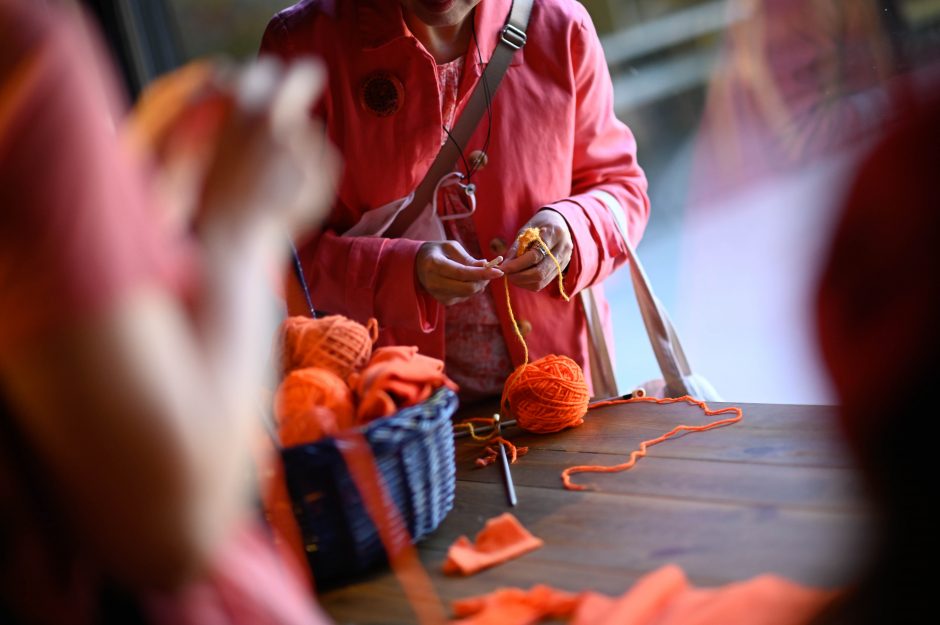Truth and Reconciliation 2024
Ways to Participate | Advancing Truth and Reconciliation | Wellness Resources
Truth and Reconciliation Week is dedicated to acknowledging and addressing the profound impact of the Indian residential school system on Indigenous communities and fostering a spirit of healing, understanding, and reconciliation.
In 2021, Orange Shirt Day, recognized as the National Day for Truth and Reconciliation, attained the status of a statutory day of observance, a development catalyzed by the heart-wrenching discoveries of countless unmarked graves near former residential school sites across the nation. This day serves as a poignant reminder of the imperative need to learn, reflect, and heal together.
The inception of Orange Shirt Day finds its roots in the harrowing experience of residential school survivor, Phyllis Jack Webstad. In 2013, Phyllis courageously shared her narrative during a commemoration project and reunion event. Her story centers on her first day at a residential school, where as a six-year-old, her clothes were removed, including the new orange shirt lovingly gifted by her grandmother. Tragically, that shirt was never returned. Today, the symbol of the orange shirt poignantly encapsulates the erasure of Indigenous identities within the oppressive residential school system.
Let us unite with a shared commitment to reconciliation and optimism, underscoring the fundamental truth that every child matters.
Ways to Participate
- UBC Faculty of Education | Alumna Carolyn Roberts: Book Launch for Re-Storying Education | Sty-Wet-Tan Great Hall, First Nations House of Learning | September 21 | 2:00 – 3:30 pm | link
- UBC Faculty of Education Teacher Education Office | Make an “Every Child Matters” orange shirt button | Enter a draw to win a book written by an Indigenous-Canadian author | Contribute to the teacher candidate display on how teachers can incorporate the First Peoples Principles of Learning in their teaching | Neville Scarfe Foyer | September 24 and 26 | 11:30 am – 1:30 pm | link
- First Nations House of Learning| Beading Circle Social | all Indigenous beaders welcome | September 4, 12, 18, and 24 | 3:00 – 5:00 pm | link
- UBC Vancouver | Belkin Gallery Decolonization Tour| September 18 and 27 | various times | RSVP
- UBC Vancouver 2024 Intergenerational March to commemorate Orange Shirt Day | 1956 Main Mall | September 30 | 11:45 am – 3:00 pm | link
- UBC Vancouver | Ever Deadly Film Screening at UBC IRSHDC Gallery | UBC Residential School History and Dialogue Centre | September 20 | 6:00 – 10:00 pm | RSVP
- UBC Vancouver | Coming Home: Honouring the Resiliency of All Survivors of the Indian Residential School Experience | The University Centre and Online | September 25 | 9:00 am – 4:00 pm | RSVP
- UBC Robson Square | s-yéwyáw: Awaken Film Screening | September 27 | 6:00 – 10:00 pm | RSVP
- UBC Okanagan | Orange Shirt Day Flag Printing Workshop | Creative and Critical Studies Building (CCS) | September 23 | 4:00 – 7:00 pm | link
- Syilx Okanagan Nation Alliance Walk for the Children | Penticton | September 30 | 10 am – 12 pm | link
- UBC Indian Residential School History and Dialogue Centre | The Catholic Church and the Indian Residential School Settlement Agreement | Virtual Exhibit | link
- UBC Indian Residential School History and Dialogue Centre | Our Children, Our Future: The Indian Child Caravan 40 Years Later | Virtual Exhibit (upcoming) | link
- National Centre for Truth and Reconciliation | Virtual Lunch and Learns | September 23 – 27 | link
- Indian Residential School History and Dialogue Centre | Streaming National Centre for Truth and Reconciliation Lunch and Learns | IRSHDC Gallery Space | September 23 – 27 | 10:00 am – 12:00 pm |link
- National Centre for Truth and Reconciliation | Live Broadcast from Parliament Hill | September 30 | 12:00 pm |link
- National Centre for Truth and Reconciliation | Virtual and Hybrid Educational Program for Grades 1-12
0
Advancing Truth and Reconciliation
UBC Faculty of Education
- UBC Faculty of Education’s Reconciliation and Decolonization Alumni Award | link
- UBC Faculty of Education Master of Educational Technology (MET) Award for Indigenous Students | link
- UBC Faculty of Education’s Master of Education (MEd) in Indigenous Education | link
- UBC Faculty of Edcuation’s Massive Open Online Course (MOOC): Reconciliation Through Indigenous Education | link
- UBC Faculty of Edcuation’s Massive Open Online Course (MOOC): Professional Development for Early Learning and Early Learning and Child Care (ELCC) Workers Through an Indigenous-Early Childhood Education | link (upcoming)
- UBC Faculty of Education | Engaging with Indigenous Curriculum: Equipping BC Educators for Decolonizing Pedagogy | link (upcoming institute)
Key Readings
- Truth and Reconciliation Commission of Canada | What We Have Learned: Principals of Reconciliation | link
- Truth and Reconciliation Commission of Canada | The Survivors Speak | link
- Truth and Reconciliation Commission of Canada | Calls to Action | link
- UBC Indigenous Strategic Plan | link
- UBC Indian Residential School History and Dialogue Centre Collections | link
Key Resources
- Orange Shirt Society | link
- UBC Indigenous Portal | link
- UBC Indian Residential School History and Dialogue Centre | link
- National Centre for Truth and Reconciliation | link
- UBC MET EDID Resources | Truth and Reconciliation Resources | link
Educational Tools
- UBC Faculty of Education | Decolonizing Teaching, Indigenizing Learning | Curriculum Bundles developed by students in the NITEP Indigenous Teacher Education Program | link
- UBC Faculty of Education Office of Indigenous Education | Indigenous Services Canada Grant: Curriculum Enhancement Projects | link
- UBC Faculty of Education Office of Indigenous Education and Teacher Education Office | Indigenous Curriculum Enhancement Project Gallery | link
- UBC Indian Residential School History and Dialogue Centre | Teaching and Learning Resources | link
- National Centre for Truth and Reconciliation | Education Resources | link
Podcasts and Videos
- UBC Indian Residential School History and Dialogue Centre | Podcast: Love, Land and Spirit| link
- UBC Faculty of Education Teacher Education Office | Decolonizing Together Symposium | teacher candidate session link | teacher educator and staff session link
- UBC Faculty of Education NITEP Indigenous Teacher Education Program | Podcast: The Grease Trail Digital Storytelling | link
- TEDx | Video: Dr. Candace Galla on Indigenous Language Revitalization | He pūkoʻa kani ʻāina: Creating Pathways for Indigenous Language Vitality | link
- Worldviews in Education | Video: Dr. Jan Hare, Dean, on Futures of Indigenous Education: Living in Right Relations | link
Wellness Resources
Engaging with Indian Residential School histories and legacies can lead to emotional reactions and difficult thoughts and feelings. Sometimes these can surface hours, days, or weeks later. Please call the crisis line if you or someone you know is triggered while reading the content of this website, or experiencing pain or distress as a result of their residential school experience.
- The National Indian Residential School Crisis Line is available 24-hours a day for former residential school students | 1.866.925.4419
- Indian Residential School Survivors Society | 1.800.721.0066 | link
- KUU-US Crisis Line | 1.800.588.8717 | link
- Tsow-Tun-Le Lum | 1.866.925.4419 | link
- Vancouver Coastal Health – Indigenous Wellness Program | 604.675.2551 or 1.866.884.0888 | link
- Canadian Mental Health Association | 1.800.555.8222 | link
- HeretoHelp | 1.800.661.2121 | link
- First Nations Health Authority – Mental Health Benefit | link
- Métis Nation BC – Mental Health and Harm Reduction | link
- Kids Help Phone | 1.800.668.6868 | link
- Talk Suicide Canada | 1.833.456.4566 or text 45645 | link
- Hope for Wellness Help Line | 1.855.242.3310 | link
- UBC Indian Residential School History and Dialogue Centre’s Healing and wellness resources for survivors and family members, Indigenous Peoples and community members, students, and UBC faculty and staff | link

